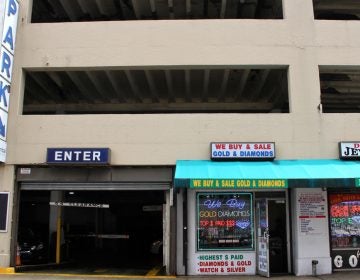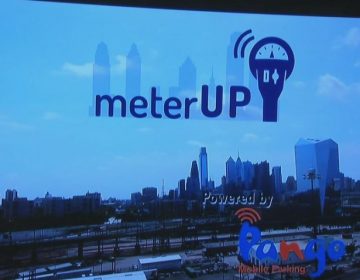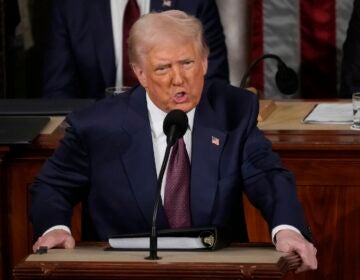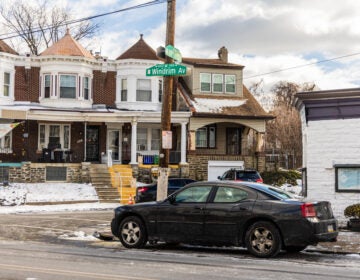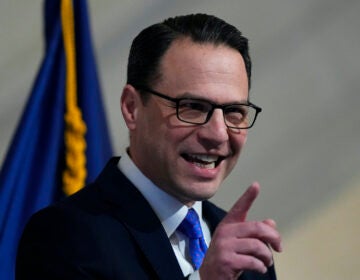Philly progressives, urbanists blast $130 million cut to city parking tax
Statements and a petition opposed a bill that would slash the tax rate to 17%, noting there was no guarantee lot workers would benefit, as promised.
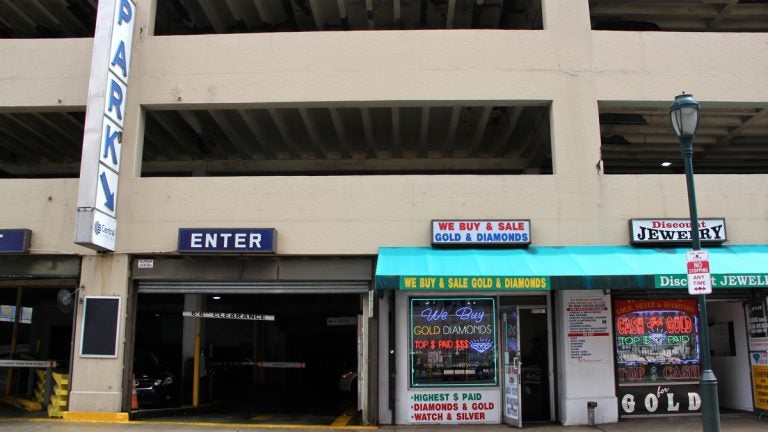
A Philadelphia parking garage at 8th and Chestnut streets. (Emma Lee/WHYY)
Opposition is rising to a City Council proposal to slash Philadelphia’s parking tax rate by nearly a third, in exchange for the promise of better pay and more work for lot employees and a boost to the city’s economy.
The city’s tax on parking lot revenues is already set to fall to 22.5% from 25% with the expiration of a temporary tax increase passed last year, but a bill introduced by Councilmember Cherelle Parker last month would lower the rate even further, to 17%. At a council hearing on the bill this week, officials estimated that the expiration would cost $40 million in forgone revenue over five years, and another $90 million were Parker’s bill to pass.
Not long after, a string of progressive elected officials and urbanist groups began raising questions about the promises that the bill would truly help parking lot employees, while others criticized the bill as a handout to parking lot companies, or as poor transit policy.
Councilmembers Kendra Brooks, Jamie Gauthier, and Helen Gym all came out publicly in opposition to the legislation on Friday, a few days after the trio of progressively aligned pols also savaged business tax cuts introduced by Mayor Jim Kenney’s budget proposal.
“[Kendra] Brooks opposes all proposed tax cuts, including the parking tax, and is calling instead for those funds to be allocated to city services that will uplift working families and those most harmed by the pandemic,” said Margaret Hart, a spokesperson for the councilmember.
State Sen. Nikil Saval, a progressive whose district encompasses many downtown garages, also gave a statement opposing the legislation.
“We should be making serious investments, not cutting taxes for parking magnates,” Saval said. “It’s a giveaway when we’re trying to determine if we can fund things like eviction prevention.”
Parker first pitched the legislation by saying it would encourage downtown visitors while helping operators rehire lot attendants laid off during the pandemic and pay them more. She said the parking tax cut wouldn’t go into effect unless a special committee concluded it would benefit workers, and pointed to support of service workers unions like SEIU 32BJ.
Meanwhile, urbanist and transit groups also began organizing against the bill, with some questioning the likelihood that the measure would help workers.
Urbanist political action committee 5th Square launched a petition on Friday calling the proposal a boon for “parking lot tycoons” and “suburban motorists” — who, the group asserts, pay a large portion of lot fees. But 5th Square spokesperson Daniel Trubman also noted that the committee meant to approve the cut included figures such as parking lot magnate Robert Zuritsky of Parkway Corp., a major political donor who has advocated parking tax cuts for years.
“There’s no guarantee the dollars will improve working conditions of parking lot and garage employees. And it’s a fabulously expensive way to do it,” Trubman said, citing reports estimating that there are about 1,000 lot employees citywide. “They could send every attendant $25,000 every year for the next five years, and it would still be cheaper than this.”
The Bicycle Coalition, which promotes bicycle and pedestrian safety, issued a statement in opposition to the tax cut, saying it would “increase motor vehicle usage at a time when people should be getting back onto public transit and utilizing active transportation.”
There could be enough support in City Council to pass the bill. But at the Wednesday council hearing, Mayor Kenney’s administration also stated its opposition. Finance Director Rob Dubow said the proposal was “too costly” and would require scrapping across-the-board business tax cuts or cutting city services.
He also expressed doubts the savings would trickle down to workers.
“Reducing the parking tax rate will most likely simply increase profits for parking lot owners and
operators,” he said. “The owners could choose to reallocate those profits by reducing fees for drivers or increasing wages and benefits for parking lot workers, but this bill does not guarantee that outcome.”
Parker’s office did not respond to specific critiques of the bill, but issued a general statement reiterating the labor potential of her legislation.
“Advocacy is one of the most essential parts of the budget process. I deeply respect it, and I look forward to hearing all perspectives,” she said. “I am unapologetic about advocating for the interests of workers, and I will remain unwavering in my support in ensuring all workers make family-sustaining wages.”
Separately, Parker has also proposed blunting the direct impact to city revenues by using pandemic recovery funds to cover the cost. But Gym shot back in a statement saying that the city simply faced more pressing uses for those funds.
“All over the city, people are calling for help,” Gym wrote. “I believe these historic relief funds should be used to keep people in their homes, stop the gun violence crisis, and bring recovery to our small businesses.”

Subscribe to PlanPhilly
WHYY is your source for fact-based, in-depth journalism and information. As a nonprofit organization, we rely on financial support from readers like you. Please give today.



